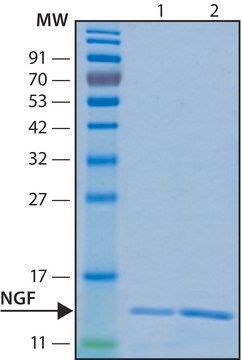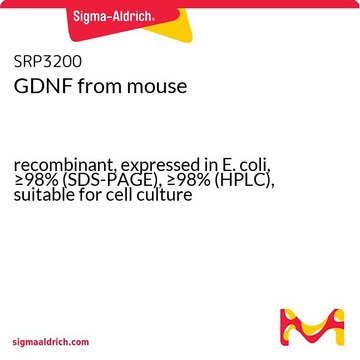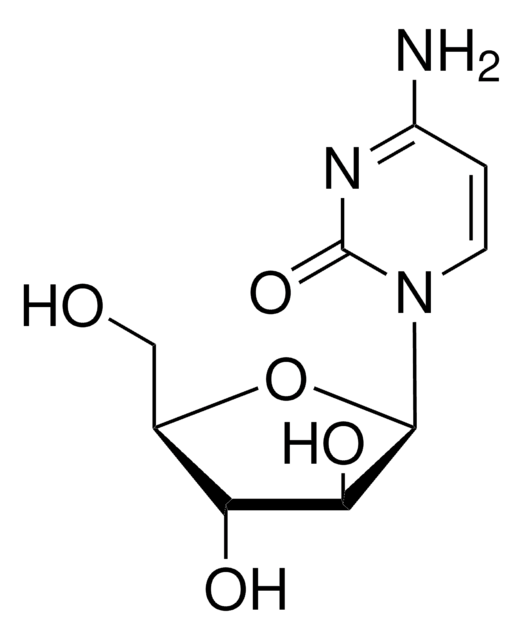Wszystkie zdjęcia(1)
Kluczowe dokumenty
N8133
Nerve Growth Factor from Vipera lebetina venom
lyophilized powder, suitable for cell culture
Zaloguj sięWyświetlanie cen organizacyjnych i kontraktowych
About This Item
Polecane produkty
Nazwa produktu
Nerve Growth Factor from Vipera lebetina venom, NGF, lyophilized powder, suitable for cell culture
pochodzenie biologiczne
Vipera Lebetina
Poziom jakości
Formularz
lyophilized powder
siła działania
0.2-20 μg/mL ED50/EC50
jakość
endotoxin tested
masa cząsteczkowa
protein 32.5 kDa
opakowanie
pkg of 0.1 mg
metody
cell culture | mammalian: suitable
zanieczyszczenia
<10 EU/vial
kolor
white to off-white
numer dostępu UniProt
temp. przechowywania
−20°C
Postać fizyczna
Lyophilized from a 0.2 μm filtered solution in sodium acetate buffer.
Uwaga dotycząca przygotowania
Isolated from the snake venom of V. lebetina.
Komentarz do analizy
The biological activity of Nerve Growth Factor (NGF) from Vipera lebetina venom is measured in a cell proliferation assay using PC-12 cells.
Ta strona może zawierać tekst przetłumaczony maszynowo.
Kod klasy składowania
11 - Combustible Solids
Klasa zagrożenia wodnego (WGK)
WGK 3
Temperatura zapłonu (°F)
Not applicable
Temperatura zapłonu (°C)
Not applicable
Środki ochrony indywidualnej
Eyeshields, Gloves, type N95 (US)
Wybierz jedną z najnowszych wersji:
Masz już ten produkt?
Dokumenty związane z niedawno zakupionymi produktami zostały zamieszczone w Bibliotece dokumentów.
Klienci oglądali również te produkty
Jeremy E Purvis et al.
Cell, 152(5), 945-956 (2013-03-05)
A growing number of studies are revealing that cells can send and receive information by controlling the temporal behavior (dynamics) of their signaling molecules. In this Review, we discuss what is known about the dynamics of various signaling networks and
Tao Yu et al.
The Journal of neuroscience : the official journal of the Society for Neuroscience, 34(17), 6098-6106 (2014-04-25)
Trk neurotrophin receptor ubiquitination in response to ligand activation regulates signaling, trafficking, and degradation of the receptors. However, the in vivo consequences of Trk ubiquitination remain to be addressed. We have developed a mouse model with a mutation in the
Federica De Angelis et al.
Journal of cellular physiology, 229(6), 783-790 (2013-10-30)
The peripheral application of the M2 cholinergic agonist arecaidine on sensory nerve endings shows anti-nociceptive properties. In this work, we analyze in vitro, the mechanisms downstream M2 receptor activation causing the analgesic effects, and in vivo the effects produced by
Yu-Jung Chang et al.
Biochimica et biophysica acta, 1830(8), 4130-4136 (2013-04-16)
Neurotrophins are important regulators for neural development and regeneration. Nerve growth factor (NGF) therapy has been tested in various models of neural injury and degeneration. However, whether NGF can reach target tissues and maintain effective concentration for a certain period
M Florencia Iulita et al.
Trends in pharmacological sciences, 35(7), 338-348 (2014-06-26)
Alzheimer's disease (AD) is a devastating neurodegenerative condition and the most common type of amnestic dementia in the elderly. Individuals with Down syndrome (DS) are at increased risk of developing AD in adulthood as a result of chromosome 21 trisomy
Nasz zespół naukowców ma doświadczenie we wszystkich obszarach badań, w tym w naukach przyrodniczych, materiałoznawstwie, syntezie chemicznej, chromatografii, analityce i wielu innych dziedzinach.
Skontaktuj się z zespołem ds. pomocy technicznej








